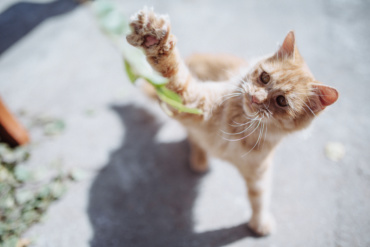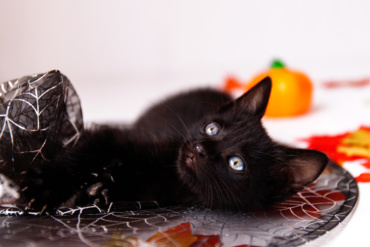Article originally published on Petfinder by Jennifer Sellers. Refer to the original article here.
When it comes to raising kittens, the philosophy is pretty similar to that of bringing up children. If you provide proper care and training when they’re young, it increases the odds they’ll grow up to be healthy, well-adjusted adults. So if you recently adopted a kitten, start incorporating this advice as soon as possible.
1) Don’t Treat Your Kitten Like an Adult Cat
Just as a human infant has vastly different needs than a teenager, a kitten will have care requirements distinct from those of a fully matured cat. In addition, you should consider a kitten’s various stages of development when caring for her:
- Under eight weeks of age. At this early age, a kitten should still be with her mother and litter mates. Because kittens this young are unable to regulate their own temperatures, they rely on one-another’s body heat to survive. In addition, they are still developing vision and leg coordination. If you adopt or foster an orphan kitten in this age group, special care will need to be taken, including bottle-feeding the kitten for every two hours up to four weeks of age and possibly helping your kitten pee and poop. It’s best to consult with a veterinarian for specific instructions and advice.
- Eight to eleven weeks of age. Kittens are usually weaned by eight weeks and should be eating kitten diet, which needs to be energy dense, rich in protein and highly digestible. Whether choosing dry kibble or wet food, be sure it is formulated for kittens. Other big changes will start occurring during this period as well. As your kitten begins developing complex motor skills she will become a force of nature — running, jumping, playing and exploring. This is a delightful period of kittenhood, but also one that can be dangerous to your kitten if she isn’t appropriately supervised. Start setting boundaries for your kitten and keep her in a safe, enclosed room while you can supervise her.
- Two to four months of age. This is a phase of rapid growth for kittens in which they’ll have almost three times more energy than an adult cat. They’ll need three to four individual meals a day during this time. According to Vetstreet.com, these meals should be minimum 30 percent high-quality protein.
- Four to six months of age. Kittens in this age group are reaching adolescence and, thus, sexual maturity. Talk to a veterinarian about having your kitten spayed or neutered before your kitten reaches this stage to avoid unpleasant habits like territorial spraying and accidental litters. (Learn more about spaying and neutering here.)
2) Reward Good Behavior and Socialize, Socialize, Socialize
The socialization and training your cat receives during kittenhood will affect how well she will likely interact with people and other animals when she’s older. “I remember the first time I fostered kittens and how worried I was about scaring them,” says Jane Harrell. “What I didn’t know was that that was a critical socialization period for them and not exposing them to things made them more nervous as adults. Now when I foster kittens I do everything I can to get them exposed to as much as possible – loud noises, walking on leashes, strangers, you name it! It all helps them become better-adjusted, healthy adult cats.” Just makre sure your kittens have a positive experience out of any socialization exposure you provide them.
As a new kitten’s parent, it will be up to you to guide her and show her that the world is a wonderful place. Consider trying some of these training and socialization methods:
- Kittens will generally use litter boxes by instinct, however you can help teach her to use it by placing her in the box after meals and play sessions. Make sure the litter box is always available to your kitten and cleaned frequently
- Pet her frequently
- Get her used to weekly combing and grooming. (Learn more about cat grooming)
- Introduce her to toys
- Allow her to experience different walking surfaces (carpet, linoleum, etc.)
- Take her outside on a lead or in her carrier (It can be very dangerous to allow a kitten outside without one.) However, before providing any outdoor exposure be sure your veterinarian has administered the proper vaccines and enough time has passed for your kitten to build immunity.
- Give her objects to explore, such as boxes and paper bags
- Play loud music and make noise
- Have friends over and ask them to play with her and give her treats
- Provide appropriate scratching alternatives (such as scratching posts) and reward her with toys, praise or treats when she uses them
- Do not allow her to bite or scratch during play. If she does, redirect her attention to a toy.
- Expose her to other cats and kittens (as soon as they’re up to date on vaccinations, of course!). There are even kitten socialization classes; do an internet search to see if any are available in your area.
- Take your kitten on car rides, giving her treats the whole time, and get her used to her carrier. (Check out these tips for getting your cat to like his carrier.)
- Reward friendly behavior with treats or praise.
- Do not reprimand bad behavior, instead, ignore her when she displays inappropriate behavior.
- Challenge your kitten to think by teaching her tricks. (Learn how to teach a cat tricks.)
- Always be patient
3) Make Preventive Care a Priority
To help ensure your kitty has a lifetime of good health, start early in providing her with preventive care:
- Schedule an appointment early. No matter what, schedule your kitten’s first vet appointment within a week of getting her. Early and frequent vet visits will help socialize your kitten with the vet and help the vet establish a baseline for your kitten’s health.
- Ask about intestinal parasites, fleas and heartworm. Have a veterinarian check your kitten for worms and intestinal parasites, and have her de-wormed, if necessary. And while heartworms aren’t as much of a problem for cats as they are for dogs, some kittens may be susceptible, so also ask your vet if he or she recommends a heartworm preventative. The biggest parasitic threat to your kitten, however, is fleas. You can start administering topical flea preventatives when your kitten is around 8 to 12 weeks of age — although some brands are formulated for kittens as young as 4 weeks old.
- Ask which vaccinations your kitten needs and how often: Preventive care for kittens may include vaccines for feline leukemia, rabies and distemper. These shots are usually first administered when a kitten is around 8 weeks of age, with boosters given every few weeks until she reaches 16 weeks of age. After that, your veterinarian can set her up on an adult vaccination schedule. He or she may also recommend additional vaccinations.
These building blocks will give your kitten the best possible start in life, but don’t forget that she’ll still need plenty of attention and care when she gets older.



